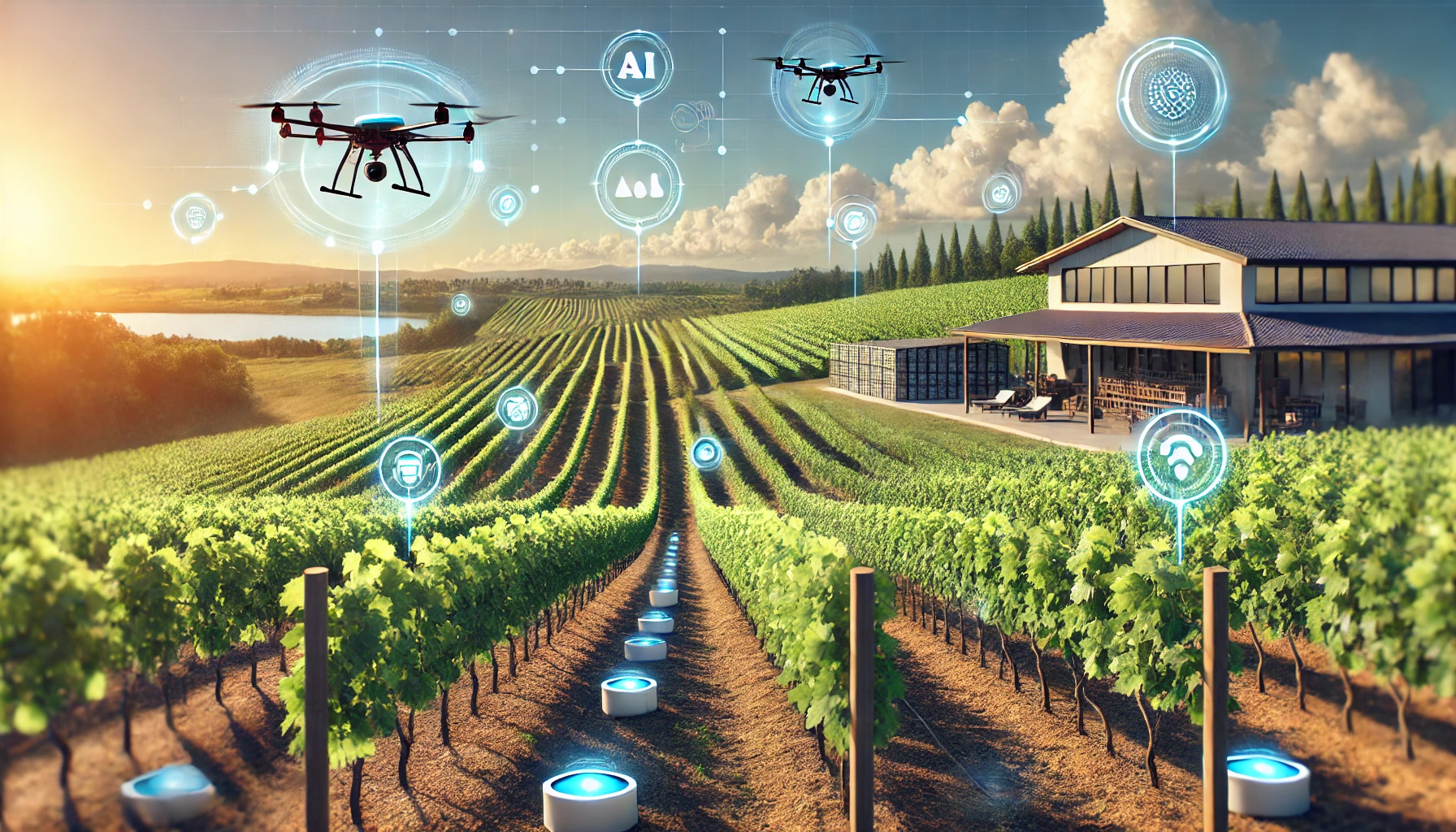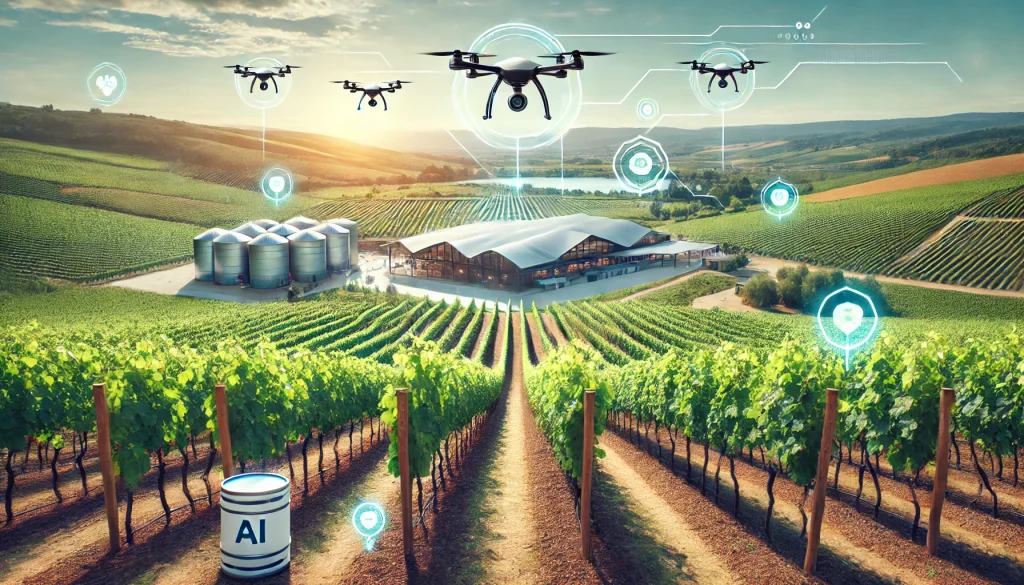
You might think winemaking is all about ancient traditions, picturesque vineyards, and passionate winemakers carefully crafting each bottle. And you’d be right! But guess what? AI (artificial intelligence) is quietly slipping into the wine industry and making quite a splash. Far from taking over the romantic art of winemaking, AI is actually enhancing it, helping everyone from grape growers to wine lovers get the best out of each glass.
So, what exactly is AI doing in the world of wine? Let’s take a look at how this futuristic technology is making waves, while keeping the charm of wine alive.
1. AI-Powered Vineyards: The Smart Grape Whisperers
Gone are the days when farmers relied solely on intuition (or a good chat with their vines) to know what the grapes need. Enter precision viticulture, where drones, sensors, and satellites gather data on soil, weather, and plant health. AI then processes all this info to suggest the best ways to care for the vineyard.
Imagine AI being able to tell a farmer, “Hey, your Syrah block could use some water today,” or, “Pests are on the move, time to act.” Companies like VitiBot and Teralytic are leading the charge in using AI to ensure vineyards are more sustainable and resource-efficient, improving grape quality while cutting waste. It’s like having a vineyard whisperer at your fingertips!
2. AI in the Winemaking Process: Fermentation Gone High-Tech
The next step in the winemaking journey is where AI continues to work its magic—fermentation. Winemakers know fermentation is where the magic happens, turning grape juice into wine. But it’s also a tricky, highly sensitive process. Even slight changes in temperature or acidity can ruin an entire batch.
AI systems like Trellis now monitor this process in real-time. They use sensors to keep track of every tiny detail, from temperature to pH levels, and can automatically adjust things to keep everything on track. Essentially, it’s like having an expert winemaker overseeing the fermentation process 24/7, without the need for sleep!
3. AI Sommeliers: Your New Digital Wine Guide
We’ve all been there: standing in front of the wine aisle, eyes glazing over as you try to pick the perfect bottle for dinner. Wouldn’t it be great if you had a personal sommelier in your pocket? Well, now you can!
Apps like Vivino and Wine Ring use AI to recommend wines based on your taste preferences. Simply rate a few wines, and the app will suggest bottles you’ll likely enjoy. It learns your preferences, just like how a human sommelier would remember your favorite style. AI sommeliers are helping wine drinkers discover new favorites without needing to become wine experts.
4. Wine Marketing: AI Knows What You Want to Drink
Ever wonder why certain wines seem to pop up on your social media feed right when you’re in the mood to shop for wine? That’s AI working behind the scenes. Winemakers and wine retailers are using AI to analyze consumer data, like what wines are trending or what people are searching for online.
AI can even personalize marketing, sending you wine recommendations based on your previous purchases or preferences. This makes finding the right bottle easier for you and gives winemakers a better idea of what to produce and when to offer discounts. It’s a win-win!
5. Wine Auctions and Collectibles: AI Sets the Price Right
For those who enjoy collecting rare wines (or dreaming about it), AI has found a home in the world of wine auctions. By analyzing historical sales data, AI algorithms help predict the value of rare bottles, making it easier to buy and sell wines at the right price. Whether you’re after a collectible vintage or trying to cash in on that bottle of Bordeaux you’ve been saving, AI is there to guide you.
6. Smart Supply Chains: Never Run Out of Your Favorite Wine Again
AI isn’t just improving what happens in vineyards and wineries; it’s revolutionizing how wine gets to your glass, too. Supply chain management is being streamlined with AI-powered predictions about what wines will sell, where, and when.
This means fewer stock shortages, more efficient delivery, and a better chance that your favorite wine is on the shelf the next time you need it. Whether it’s predicting demand spikes during the holidays or optimizing delivery routes, AI is helping the wine industry run smoother.

7. Wine Innovation: New Flavors, Consistency, and Quality
With AI in the winemaking process, there’s a growing potential for innovation in wine styles. AI can analyze flavor profiles to help winemakers craft new blends, experiment with different fermentation techniques, or even fine-tune existing wines for better consistency.
Some wineries are even exploring robot wine tasters (yes, really!) that can chemically analyze wine and offer recommendations for improving flavor or adjusting blends. It’s like having a critic built into the wine production process, making sure each bottle tastes as good as possible.
AI in Wine: Enhancing Tradition, Not Replacing It
The idea of robots making wine might sound a bit too futuristic, but AI is really about helping the experts, not replacing them. With more accurate data, predictive insights, and the ability to automate mundane tasks, winemakers and vineyard owners can focus on what they do best: crafting wines with soul.
AI is allowing the wine industry to be more sustainable, efficient, and innovative, while still preserving the heart and tradition of winemaking. So next time you sip your favorite vintage, just remember: behind that perfect glass, there might be a little help from AI.